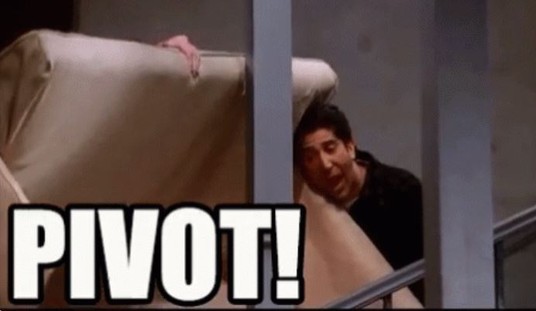So, remember that big to-do over Netflix’s decision to stream a French film, “Cuties,” about an 11-year-old girl who joins a troupe of other preteen twerking girls? People who were angry about it were told that ackshually, the film doesn’t really sexually exploit children.
Well, Netflix has released the movie. Here’s a clip (if you can stomach it). You tell us if this is art or just red meat for pedophiles:
Netflix is comfortable with this. Plenty of people will defend it. This is where our culture is at. pic.twitter.com/UlqEmXALmd
— Mary Margaret Olohan (@MaryMargOlohan) September 10, 2020
I understand this video is upsetting and depicts little girls in a gruesome light. I tweeted it for those who will say that “Cuties” is innocent. Here’s your evidence.
— Mary Margaret Olohan (@MaryMargOlohan) September 10, 2020
So maybe the people who were upset about the subject matter of “Cuties” were onto something, then?
So, I thought the Cuties/Netflix thing was being sensationalized… but the IMDB trigger warning literally describes "female breast nudity of a minor(!!!)"
If you had that on your computer, you're going to jail. If it's on Netflix, it's art??? pic.twitter.com/0eu8dZDX5j
— Cabot Phillips (@cabot_phillips) September 10, 2020
I’m dead serious, people should go to prison for this.
“Lawfully defines as pedophilia” and look at the media ratings.
All of you are going to hell. #Cuties pic.twitter.com/Vf4MrwEQuV
— Jason Howerton (@jason_howerton) September 10, 2020
I watched the Cuties clip. Prior to, I thought, “it can’t be that bad, right?” Wrong. It’s horrible. It’s exploitation of children. It is borderline child pornography. Really horrible stuff. People aren’t being dramatic.
— Taylor Hathorn (@TaylorHathorn) September 10, 2020
Ah, but the New Yorker thinks they’re being extremely dramatic:

That tweet is gone, but the piece is still up:
And of course, this is somehow the headline https://t.co/lvk7sjJEqO pic.twitter.com/kYrdcppf2L
— Evie Fordham (@eviefordham) September 10, 2020
Recommended
Don’t worry. The article’s worse.
https://twitter.com/tnyfrontrow/status/1303443751831044096
Screenshot because that tweet’s been memory-holed, too:

Richard Brody begins:
On Wednesday, Netflix releases “Cuties” (“Mignonnes”), the remarkable first feature from the French filmmaker Maïmouna Doucouré. Unfortunately, the platform’s misleading advertising has given rise to a scurrilous campaign against the film itself. The promotional image, showing young girls in bikini-like clothing dancing in provocative ways, matched with an inaccurate description, has been taken to suggest that the film celebrates children’s sexualized behavior. In fact, the subject of the film is exactly the opposite: it dramatizes the difficulties of growing up female in a sexualized and commercialized media culture. I doubt that the scandal-mongers (who include some well-known figures of the far right) have actually seen “Cuties,” but some elements of the film that weren’t presented in the advertising would surely prove irritating to them: it’s the story of a girl’s outrage at, and defiance of, a patriarchal order.
And here’s how his piece concludes:
The subject of “Cuties” isn’t twerking; it’s children, especially poor and nonwhite children, who are deprived of the resources—the education, the emotional support, the open family discussion—to put sexualized media and pop culture into perspective. Left on their own—Angelica, for instance, is virtually unsupervised by parents who are working very hard to keep their restaurant afloat—they’re unable to find or even to seek the line between liberation and exploitation, between independence and imitation. “Cuties” is about the absence of knowledge and absence of reasonable discourse about sex and sexuality, power and desire, that help young people to avow and confront these drives constructively—or, at least, not too destructively. Lacking those things, Amy latches on to a mode of revolt that is itself a trope of a misogynistic order.
“Cuties” is a film of the center, and it’s aesthetically of the center—it depicts the unconsidered without advancing to the realm of the subjective, and it doesn’t allow its young protagonists much discourse, outer or inner. It’s not a movie of introspection and self-consideration; it’s more a story of the rule than of the exception, of what’s unduly extraordinary about the effort to live an ordinary life. As such, it’s a story of French society at large—its exclusions and the exertions demanded to overcome them. Though many of Amy’s actions are dubious, her spirit of revolt is nonetheless sublime and heroic. “Cuties” dramatizes what people of color and immigrants endure as a result of isolation and ghettoization, of not being represented culturally and politically—and of not being represented in French national mythology. Its underlying subject is the connection of personal identity to public identity—and the urgency of transforming the very notion of French identity, of changing the idea of who’s considered the representative face of France. That idea is brought to the fore in an extraordinary, brief, symbolic ending; it’s enough to give a right-winger a conniption.
























Join the conversation as a VIP Member